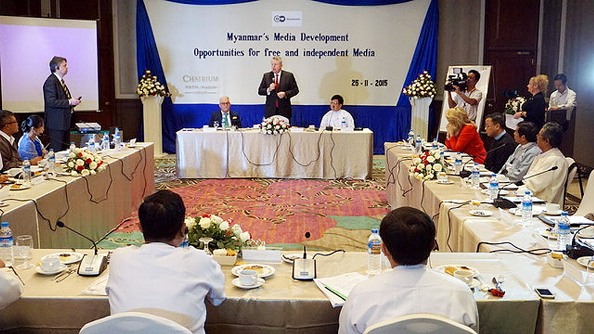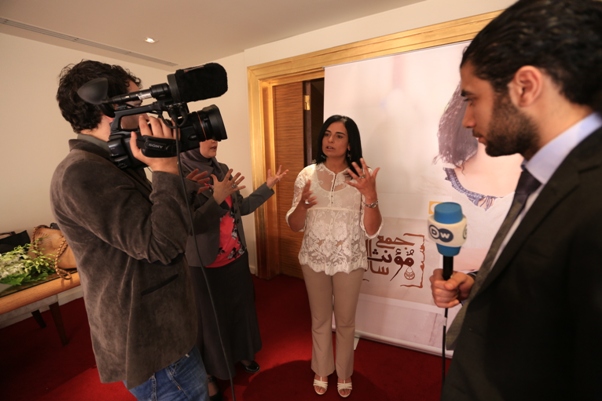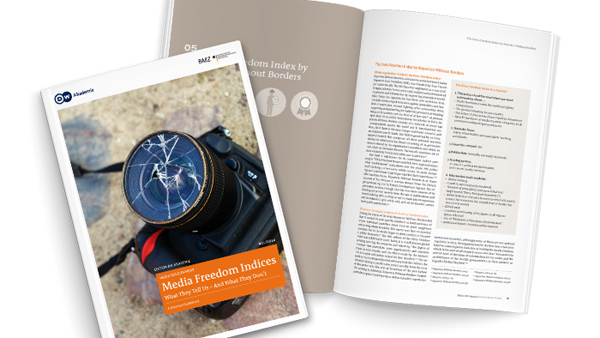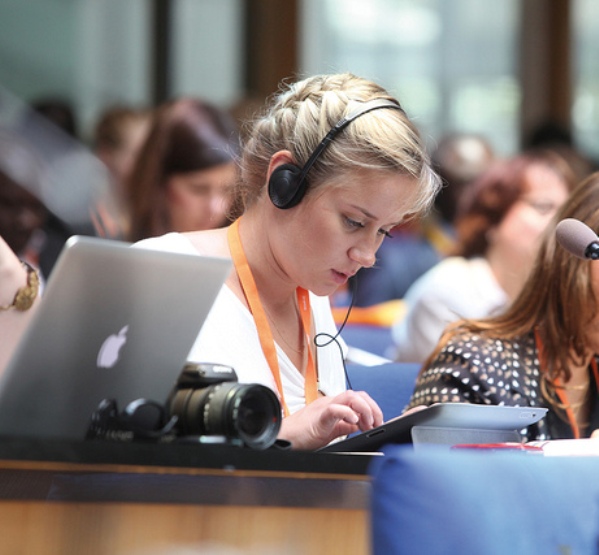Search Results for Tag: Reporters Without Borders
Building a free press from the ground up in Myanmar
With the change in government in Myanmar, a new broadcasting act is to be put in place that will allow private television broadcasting for the first time in the history of the country.
It is a critical time for Myanmar, which had been ruled by military dictatorship from 1962 to 2011, and with former military leaders continuing to maintain power in parliament since that time. After a parliamentary election on November 8, the NLD party that supports liberal democratic values won a landslide majority vote and now has the mandate to govern.
The importance of a free media in developing liberal public institutions will make itself very apparent in the near future and the level of press freedom that will actually be allowed is something to monitor. Myanmar currently ranks 144th out of 180 nations on the Reporters Without Borders Press Freedom Index. Harassment and imprisonment of journalists was widespread in Myanmar as recently as 2014.
This is why institutions like DW Akademie can make a huge difference. As Germany’s largest media development organization, it has been deeply engaged in media development in Myanmar since 2012. With the changes in the past year, DW Akademie’s activites in Myanmar have been greatly expanded. In October 2015, DW Akademie worked in cooperation with the United Nations Development Programme (UNDP) and organized a series of workshops to introduce how community broadcasting works. Myanmar also elected a press council and DW Akademie representatives attended the ceremony. Earlier in 2015, DW Akdemie organized a training program for local journalism teachers that will help support the development of local media and promote a culture of quality media at its roots.
DW has also been a consistent trusted advisor to the state broadcaster MRTV and in 2014 helped found the Myanmar Journalism Institute, the first private journalism school in Myanmar. At a recent event, organized by DW Akademie in Yangon, DW’s Director General Peter Limbourg met with media representatives to discuss the opportunities and challenges of the transition.
There has also been criticism of a 2014 News Media Law in Myanmar from the free speech watchdog Article 19, with the safeguards for media freedom being,”heavily qualified and insufficient to meet international standards.” The media situation began to look better on paper, but according to Article 19, the laws often relied on imprecise legal language that doesn’t fully guarantee freedom of expression.
Besides the trappings of governance, there is also the issue of developing a confident and effective media culture in Myanmar, so that journalists know how to do their jobs and take advantage of their potential new freedoms.
Though the transition into a free media market will be a bumpy ride for broadcasters and other media operators in Myanmar, an essential aspect of quality journalism begins from the ground up. If journalists posses skills and resources, combined with freedom to report and produce stories that have a positive effect on the social development of Myanmar, the business side of the problem could have less of an adverse impact. If the new government continues a legacy of bureaucratic and back-door control of the media, it will say a lot about where the country is heading.
DW strengthens cooperation with Egyptian partner ONTV
DW has taken a big step forward in developing closer cooperation with Egyptian partner ONTV, one of the most popular news and information networks in Egypt. The new DW-ONTV co-production, Women at a Turning Point, represents the first time the two broadcasters have worked together on a production and is a turning point in their ongoing four-year partnership. Women at a Turning Point will begin broadcasting May 2 on DW (Arabia).
The host of Women at a Turning Point, Reem Magued, is a highly recognized media personality in Egypt and has been described as one of the most vocal Egyptian journalists when reporting the truth about important internal events to local audiences. DW’s new partnership with Magued is just the latest example of ongoing close cooperation with Egyptian media. Last year, famous Egyptian satirist Bassem Youssef was a keynote speaker at the Global Media Forum. Other cooperative initiatives with Egyptian media include development workshops with DW Akademie.
As an international broadcaster, DW has an important role to play in providing Egyptians with an impartial international perspective they can use to better understand events affecting their lives. Press and media oppression in Egypt is a pervasive issue and journalists or bloggers can face severe punishment for doing their jobs. Egypt ranks 158 out of 180 in the 2015 Press Freedom Index from Reporters Without Borders.
The fight for freedom of opinion
DW makes education a priority – in all respects. Our DW Akademie has been trusted with the task of providing training to media professionals worldwide – especially in countries or areas where this proves to be difficult. DW Akademie is publishing as well – with research and reports dealing with the most pressing media issues. The first of a new series is online now: Media Freedom Indices. What They Tell Us – And What They Don’t.
Every year organizations such as Reporters Without Borders and Freedom House publish their respective press freedom rankings. They usually cause an outcry, especially from countries low on the list. While politicians hotly defend their media policies, opposition parties and NGOs seize the opportunity to criticize the government’s approach.
Media researcher Laura Schneider uses data as well as interviews with experts to examine the methodology used in each of the five best known press freedom indices. She takes a closer look at the organizations doing the ranking as well as how they conduct their respective ratings. Schneider also investigates the advantages and disadvantages of each index and points to aspects which could be improved.While press freedom rankings determine national and international media policies, it is not always clear as to how objective these rankings really are.
Schneider’s biggest criticism is that the ratings aren’t objective, often being carried out by a handful of academics or media experts who are mostly from western countries. This inevitably results in a bias, especially as the majority of the ranking organizations fail to state their exact definition of media freedom.
Download the report here.
Protecting the fundamental rights of information and expression
The values of liberal democracy are firmly rooted in freedom of expression and information. These vital pillars of society however need to be protected as technology shifts the channels of information and new methods of control are applied. The current state of these fundamental rights in the digital world is on the agenda at the 2014 Global Media Forum.
The international human rights organization, Amnesty International, in cooperation with the German Institute for Human Rights, will cover these issues in a talk titled An ice age for privacy? The rights to free speech, information and privacy versus mass surveillance. The discussion will emphasize how privacy of information is essential to preserving freedom of expression by looking at examples such as Edward Snowden blowing the whistle on the NSA’s digital surveillance and exposing institutional violations of privacy. The talk also explores how to protect the media and whistleblowers and how much privacy must be exchanged in the name of security.
Reporters Without Borders will host a discussion on how digital technology enables journalists to reach sources and gather news more effectively while at the same time endangering their ability to keep that information secure. The talk titled strengthening freedom of information and source protection worldwide, will highlight methods used by journalists to protect their information while analyzing the motivations of so-called “enemies of the Internet”, who use digital technology for censorship rather than the diffusion of information.
Blogs have grown from being an informal method of online expression into a real force in sharing information, especially outside traditional channels which in certain cases are censored and controlled. In a talk hosted by IREX Europe titled The rise of citizen journalism and its impact on traditional journalism in Russia, the state of the blogosphere will be analyzed with a focus on Russian bloggers. Special emphasis will be placed on the Internet as a “digital battlefield” with new laws being used to restrict online freedom of information as online activists fight to be heard.
Next week we will look at selected examples of specific techniques and technologies that are being used in digital media and journalism.
DW Akademie helps journalists protect their data
It is becoming a dangerous digital world out there with everything from hackers phishing for passwords to governments spying on communications. Journalists are often in possession of very sensitive information and there is the persistent danger of it falling into the wrong hands. Learning how to securely save and transfer information has therefore become vital to the skill set of modern journalists.
DW is on the front line in the fight for digital security. This week, DW Akademie is hosting free online workshops about Digital Safety for Journalists, in cooperation with Reporters Without Borders. The seminar is open to everyone interested in learning more about Internet security and consists of six sessions held by digital safety experts and journalists.
Some of the experts include Ala’a Shehabi an activist and journalist based in Bahrain, Anne Roth from Tactical Tech, an NGO that works on digital security for activists and Morgan Marquis-Boire, a digital security researcher and technical advisor. You can explore the issues on the community page which will be continuously updated and you can follow the sessions on Twitter at @dw_akademie and #digisafe. Don’t miss out, register now for the seminar and learn how to protect yourself online.
What will the future look like for the silicon savannah?
DW Akademie is also currently accepting proposals for papers to be presented at the fifth Deutsche Welle Media Dialogue in May. The topic this year addresses different social and structural challenges affecting the media in Kenya. Media academics, political scientists, economists, academic lawyers and journalists can register online to join the symposium and upload their proposals. The deadline for submissions is January 31, 2014.
The symposium will be held in two parts. The first session will cover media legislation and media ownership in Kenya with a look at the current media landscape and what developments are to be expected. The second session will look at journalistic standards and ethical practices with an extra focus on election coverage. The development of communication technology in Kenya has been seen as an African success story. The next step will be to ensure that the information being shared on the new networks meets journalistic standards. The symposium and presentations will be in English.













Feedback